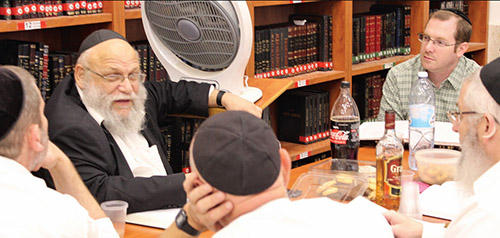 Last Thursday, Rav Chaim Zev Malinowitz, z”l, the editor of the Artscroll Talmud, as well as a shul rabbi in Ramat Bet Shemesh, suddenly passed away at the young age of 67. Various charedi news sites are calling him a gaon (genius) and a leading posek and Talmid chacham (Torah sage) in our time. While I always knew Rabbi Malinowitz was extremely learned, I knew a very down-to-earth side of him that seems so distant from the headlines. Perhaps true greatness does not only come about due to vast Torah knowledge and conviction, but in also being a human being who can talk to and understand regular people.
Last Thursday, Rav Chaim Zev Malinowitz, z”l, the editor of the Artscroll Talmud, as well as a shul rabbi in Ramat Bet Shemesh, suddenly passed away at the young age of 67. Various charedi news sites are calling him a gaon (genius) and a leading posek and Talmid chacham (Torah sage) in our time. While I always knew Rabbi Malinowitz was extremely learned, I knew a very down-to-earth side of him that seems so distant from the headlines. Perhaps true greatness does not only come about due to vast Torah knowledge and conviction, but in also being a human being who can talk to and understand regular people.
Rabbi Malinowitz first came into my life when he emailed me out of the blue. It was four years after I started Jew in the City, and it was four years that I had been working for free, not sure if my crazy idea of trying to start a worldwide campaign to make over the image of Orthodox Jews would work. An email arrived one day from this rabbi I had never heard of, asking for the link to see a three-part series I had given on WebYeshiva telling the story of how I had become observant. He told me, “Your work is remarkably good, keep it up!”
I didn’t get emails from rabbis I didn’t know too often, so I looked him up and it seemed that the rabbi who had emailed me was the editor for the Artscroll Gemara. I asked if he was, and he confirmed it. And suddenly I had this champion on my side who lived in a world a bit far from my own, both in terms of location and how we grew up.
“You have a gift. You have created a niche I have not heretofore seen,” Rav Malinowitz wrote in another email. Maybe I was clueless as to how big a rabbi I was talking to or just desperate to finally find some paid work after working for free for so long (while my husband was finishing up law school), but I told Rabbi Malinowitz that I was looking for speaking gigs, and I wanted to know if he could help. He actually picked up the phone and made some calls for me, never acting like it was beneath him. He wanted me to start focusing on the uninspired “religious from birth” crowd. He thought my unique perspective would be impactful there. I argued that outreach to non-observant Jews was closer to my heart—it was my own story. But then Project Makom came about, and suddenly I was involved in the work that Rabbi Malinowitz told me I belonged in all along.
I had a cookbook idea I pursued at one point several years ago—to turn tref recipes of my childhood into kosher ones (with soy replacements and the like)—like the journey I had made. A food memoir. I asked the rav if he could make some connections for me at Artscroll. Again—nothing was beneath him. He made several intros and would even check in with me on the progress! A member of his shul had written a blog post about my partner in Torah, Mayim Bialik, and he sent it to me. He was impressed that she was doing teshuva in the middle of Hollywood and he sent us books to learn together from Artscroll.
Rabbi Malinowitz would discuss problems he saw in the kiruv world with me—asking for my opinion. He took my perspective very seriously. Even though he was such a Torah giant, he felt that I had my finger on the pulse of a world beyond him and valued the perspective and insight I brought. In fact, on a few occasions, when someone came to him (sometimes even other rabbis!) asking him advice on how to deal with a matter that involved a less observant family member or someone who was moving away from observance, Rabbi Malinowitz would just loop me into the conversation (no heads up beforehand—that was his style!) and tell the person, “This woman will tell you how to handle this.”
Rabbi Malinowitz was an old-school charedi rabbi, and he’d sometimes rib me, saying “This better not be feminism motivating you!” if I ever said something that sounded like “feminism” to him. But his valuing the voice of a woman and treating me, a generation his junior, and far less knowledgable in Torah, as a respected colleague was incredibly empowering. He seemed to read everything we published. At times, he’d email me how great it was, adding in his own Torah insight. On an article I once wrote on faith, he emailed me that he found it personally impactful. Again—so humble, so real to say that rabbis need chizuk too. He’d often quote “Don Quixote” in emails to me and cite “Chovos Halevavos”—two books I haven’t read, but now feel drawn to. Only a couple times in the nine years we were in touch did he push back at an idea I wrote, and then we’d hash it out. By the end he’d often say something like, “Maybe this old dog can learn new tricks.”
There were a couple instances when I tried to get him on board for a project we were quietly working on—taking a stand against a problem we had become aware of in the frum world. He always wanted to help, but assured me his name wasn’t worthwhile. So he offered involvement, but not like how I wanted. But even in a of couple instances, when he and I didn’t see eye to eye at first, he came back to me later to admit that he saw more where I was coming from. Not many people will come back to you to say, “You told me so.” When we’d engage in heated debates via email, he’d sometimes warn me to read what he wrote carefully because he knew I had a tendency to gloss over details. My husband and I found it amusing that this rabbi knew and called out this shortcoming of mine.
Recently, an opportunity came our way to partner with a charedi organization that is a bit more traditional than our brand is, but that several people felt would be a strategic move for our growth. The organization approached the rav to ask his opinion on us this past Wednesday night, and in one of his last acts on earth, he again defended us and told the organization to find a way to work together because our work is so crucial. Because of him, they agreed.
I found this out on Thursday, hours after he died.
Rabbi Malinowitz and I never met. Our relationship spanned over 1000 emails in almost a decade and a few phone calls. I wanted to email him when I heard how he stood up for JITC one last time, but there is no email in heaven, as far as I know. Rabbi Malinowitz publicly donated $1000 to our last two crowdfunding campaigns, without anyone soliciting him.
Other than my own family, there has never been such a stalwart supporter of our work, who’s followed it so closely and cheered me on for years, despite being so far away.
It seemed only proper to memorialize the rabbi on the pages of a site that was so dear to him. I created Jew in the City to confront the stereotypes people have about Orthodox Jews, and Rabbi Malinowitz certainly was not what many people would expect when it came to a black-hat rabbi and Torah scholar, in all the best ways.
I hope that there is internet in Olam Habah, Rabbi Malinowitz, and that you know how grateful I am and will always be for your unwavering support. Please continue to be our supporters and defenders from on high. I hope our work here at Jew in the City and Project Makom will continue to give you nachas as you bask in the light of our Father in Heaven in Gan Eden with the other tzadikim of klal Yisrael.
(This article first appeared on the Jew in the City site and is reprinted with permission. The original article can be viewed here.)
By Allison Josephs













